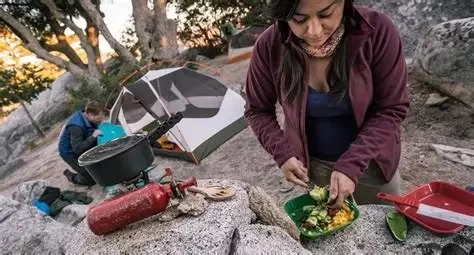Learn how to deal with food poisoning and nausea while camping. Discover prevention tips, real stories, and practical remedies to stay safe and enjoy your outdoor adventure.

- 1 - Understanding Food Poisoning While Camping
- 2 - Early Signs and Symptoms to Watch For
- 3 - Immediate Steps to Take When Symptoms Appear
- 4 - Remedies and Practical Tips for Relief
- 5 - Real Camper Experiences and Lessons Learned
- 6 - Prevention Strategies to Avoid Foodborne Illness
- 7 - Trusted Support for Campers
Understanding Food Poisoning While Camping
Food poisoning while camping can turn an exciting adventure into a stressful ordeal. Since most campsites lack refrigeration and rely on portable cooking setups, the risk of spoiled food increases. Understanding the causes—such as undercooked meals, contaminated water, or improper food storage—is the first step to minimizing risk and ensuring a safe trip.
Early Signs and Symptoms to Watch For
Symptoms of food poisoning and nausea while camping usually include stomach cramps, vomiting, diarrhea, and fatigue. Recognizing these early signs is crucial, as they can escalate quickly in the outdoors where medical facilities may be far away. Staying alert and prepared helps campers act before the illness worsens.
Immediate Steps to Take When Symptoms Appear
If you or a fellow camper shows signs of food poisoning, the first priority is hydration. Drinking clean water in small sips can prevent dehydration caused by vomiting and diarrhea. Rest in a shaded, comfortable spot, and avoid further solid food until symptoms improve. For severe or prolonged cases, seeking medical help is essential, even if it means cutting the trip short.
Remedies and Practical Tips for Relief
Carrying a small first-aid kit with anti-nausea medication, electrolyte packets, and activated charcoal can provide quick relief during a camping trip. Ginger tea or peppermint, if available, can also help ease nausea naturally. Resorts such as Pine Cliff Resort often provide guidance on essential camping health supplies, making it easier for adventurers to be prepared before heading out.
Real Camper Experiences and Lessons Learned
One camper shared how a poorly stored chicken dish caused food poisoning that forced their group to abandon their weekend trip early. Another family recounted how carrying electrolyte drinks saved their teenage son from severe dehydration after a bout of nausea. These real stories underline how important preparation and quick action are when dealing with foodborne illness outdoors.
Prevention Strategies to Avoid Foodborne Illness
Prevention is always better than treatment. Campers should pack food in insulated coolers, cook meals thoroughly, and wash hands frequently—especially before handling food. Using bottled or purified water also minimizes risk. Packing dry, non-perishable food options can further reduce the chance of spoilage and contamination during long camping trips.
Trusted Support for Campers
Whether you’re a first-time camper or a seasoned explorer, being equipped with the right knowledge and supplies makes all the difference. Reliable destinations like Pine Cliff Resort not only offer scenic camping experiences but also share practical guidance on staying healthy outdoors. Choosing trusted resources ensures that food safety doesn’t overshadow the joy of camping by the lake or in the woods.
Aspenwood Resort
980 US-89, Browning, MT 59417, USA
Visit Location PageSouth Shore Pavilion
Crescent, OR 97733, USA
Visit Location Page